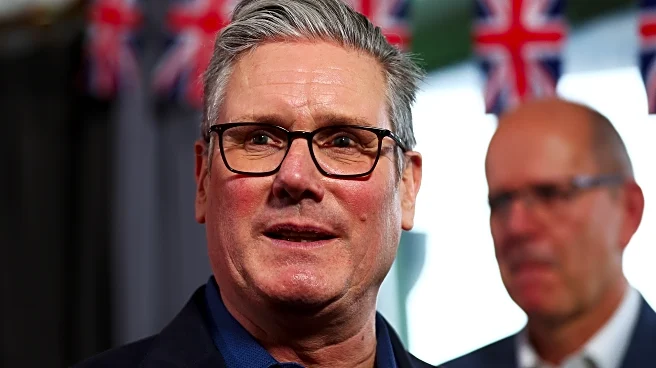What's Happening?
A recent Yahoo/YouGov poll indicates a decrease in the number of Americans who believe the U.S. will cease to be a democracy in the future. The survey, conducted with 1,676 U.S. adults from September 25 to 29, 2025, shows a decline in fears about the country's democratic future compared to three years ago. In June 2022, 49% of respondents thought it was somewhat likely that America would stop being a democracy; this number has now dropped to 44%. Similarly, the belief in the likelihood of a civil war occurring in one's lifetime has decreased from 46% to 41%. The poll also highlights a reduction in the acceptance of political violence, with fewer Americans justifying physical violence, assassination of political officials, or taking up arms against the government. The survey reflects a shift in attitudes, particularly among Republicans, who show increased optimism about the country's democratic stability.
Why It's Important?
The findings of this poll are significant as they suggest a shift in public sentiment towards a more optimistic view of the U.S. democratic system. This change could influence political discourse and policy-making, as fears of democratic collapse and civil unrest have been prevalent in recent years. The reduction in the acceptance of political violence indicates a potential decrease in political polarization and extremism, which could lead to more constructive political engagement and dialogue. The poll's results may also impact political strategies, as parties and candidates might adjust their messaging to align with the public's evolving perceptions of democracy and governance.
What's Next?
As the U.S. approaches future elections, these changing perceptions could influence voter turnout and engagement. Political leaders and parties may need to address the public's concerns about democracy and work towards fostering trust in democratic institutions. The decline in fears about democracy's future might encourage more bipartisan efforts to strengthen democratic processes and reduce polarization. Additionally, the decrease in support for political violence could lead to a more peaceful political climate, encouraging dialogue and compromise across party lines.
Beyond the Headlines
The poll's findings highlight the importance of context in shaping public opinion. Real-world events, such as the assassination of conservative activist Charlie Kirk and the suspension of late-night host Jimmy Kimmel, have influenced public attitudes towards political violence and extremism. This underscores the need for political leaders to address the root causes of polarization and work towards building a more inclusive and resilient democratic society. The poll also reveals that while political polarization remains, there is a growing recognition among Americans that vilifying the opposing side is counterproductive, which could pave the way for more constructive political discourse.











